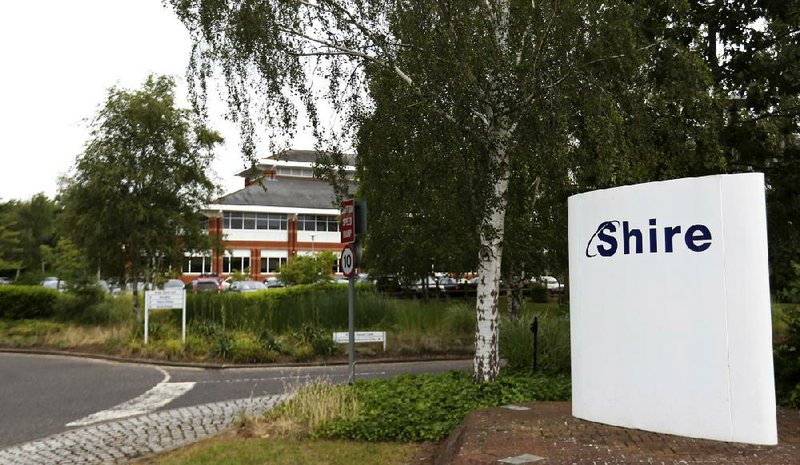The pharmaceutical company AbbVie agreed Friday to buy its European rival Shire for about $54 billion in the biggest takeover deal this year.
If completed, the combination would create one of the 50 largest companies in the world. With a market value of more than $137 billion, the enlarged AbbVie would be worth more than Boeing, McDonald's and Cisco.
The takeover will allow AbbVie, based near Chicago, to reincorporate in Britain, allowing the U.S. company to reduce its overall tax bill. The company said Friday that it expected that the transaction would lower its effective tax rate to 13 percent by 2016 from 22.6 percent in 2013 last year.
"It will be domiciled in the U.K. for tax purposes," AbbVie's chief executive, Richard Gonzalez, said on a call with analysts Friday. "This structure provides AbbVie with flexible access to its global cash flows."
The deal would be the largest-ever inversion: AbbVie, a recent spinoff of Abbott Laboratories, would be reincorporated on the small island of Jersey, in the English Channel. Shire, based in Dublin, is already incorporated in Jersey. A wave of U.S. companies -- primarily in health care -- have sought to do similar deals that would allow them to reincorporate in countries such as Britain, Ireland or the Netherlands that have lower corporate rates than in the United States.
The acquisition of Shire comes as Washington politicians are speaking out against U.S. companies that move their tax domicile overseas in such deals. On Tuesday, Treasury Secretary Jacob Lew sent letters to senior members of Congress, encouraging them to pass legislation halting inversions. His proposal would be retroactive -- potentially thwarting AbbVie's ability to reincorporate in Britain -- but Sen. Orrin Hatch, the Utah Republican who is the ranking member of the Senate Finance Committee, has objected to any retroactive penalties.
Gonzalez said the debate in Washington should focus on broad corporate tax reform rather than specifically on inversions.
"Companies like ours need access to our global cash flows," he said on the call. "Today we're at a disadvantage to many of our global competitors. That's the important debate we should be having around inversions."
When pressed by analysts, Gonzalez was adamant that taxes were not the primary driver of the deal.
"This is a transaction we believe has excellent strategic fit," he said. "We wouldn't be doing it if it was just for the tax impact."
AbbVie appears to be betting that U.S. laws won't change. Several recent inversion deals have included clauses that would allow the buyer to walk away or renegotiate terms if inversion laws change.
But this deal does not include any provision that would allow AbbVie to back out or renegotiate if Congress votes to crack down on inversions retroactively. Shire asked that no such provision be included in the merger agreement, and AbbVie agreed to not include it, according to people briefed on the negotiations.
And while the combined company will benefit from a lower effective tax rate, the transaction itself will be taxable to shareholders. This could result in a steep one-time tax bill for investors once the deal closes.
The cash-and-stock offer values Shire's shares at roughly $91.06, which is more than 50 percent higher than the drugmaker's closing share price in May before a prospective deal was first announced. Shire shareholders are expected to own roughly 25 percent of the newly combined company once the deal closes, according to a joint statement from AbbVie and Shire.
Shire's U.S. shares rose 1.4 percent to close Friday at $257 on the Nasdaq exchange, and AbbVie's shares rose 2.6 percent to close at $54.91 on the New York Stock Exchange.
AbbVie succeeded in winning agreement from Shire's board only with a fifth bid Sunday night. After that, negotiations moved quickly. Starting Tuesday, teams of executives and advisers from both companies met at the New York offices of Davis Polk & Wardwell, a law firm advising Shire, to hammer out the details. On Thursday, the Shire board met in Geneva, and the AbbVie board met in Chicago, finalizing the deal.
Shire's chief executive, Flemming Ornskov, played his hand well, according to people briefed on the negotiations. Having taken over Shire only recently, he had accelerated growth and outlined an ambitious expansion plan.
When AbbVie approached, he held out for higher offers but did not disparage the suitor or its management team. He won a rich premium for Shire shareholders and has pledged to remain with the combined company.
Ornskov's actions stand in contrast to those of the chief executives of other pharmaceutical companies recently targeted for deals. Pascal Soriot, the chief executive of AstraZeneca, refused to engage with Pfizer when the U.S. drugmaker attempted a $119 billion takeover. Pfizer walked away.
And Allergan, the maker of Botox, is fighting Valeant, which is attempting a hostile takeover.
It's not only tax considerations that drove the deal announced Friday. AbbVie is keen on Shire's stable of products, which includes Adderall, used in the treatment of attention deficit disorder. One of AbbVie's leading drugs, Humira, which is used to treat arthritis, comes off patent protection in 2016, providing a motivation for AbbVie to find new sources of revenue. The enlarged company is likely to have annual sales of about $25 billion.
AbbVie, which had sales of nearly $19 billion in 2013, has about 25,000 employees in more than 170 countries. Shire, with revenue of $4.9 billion last year, has about 5,000 employees in 30 countries.
Business on 07/19/2014

